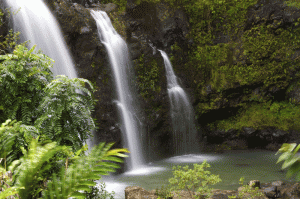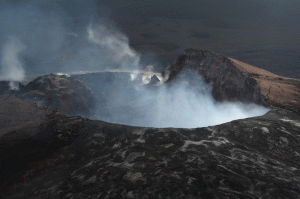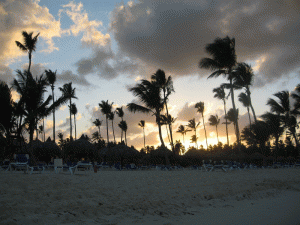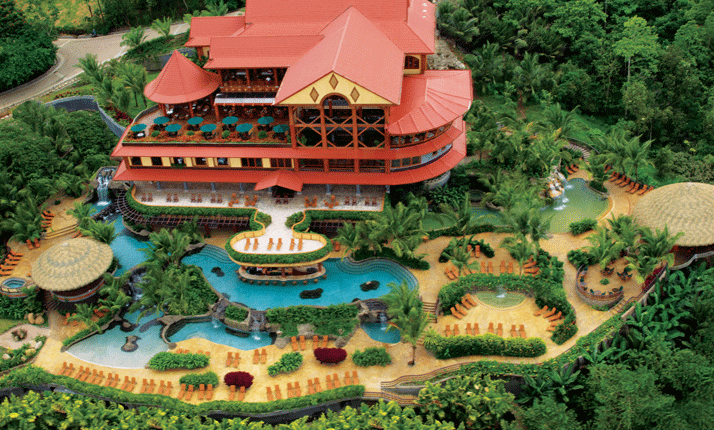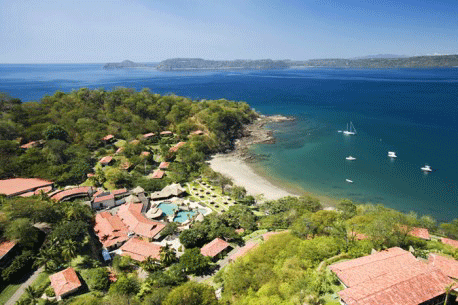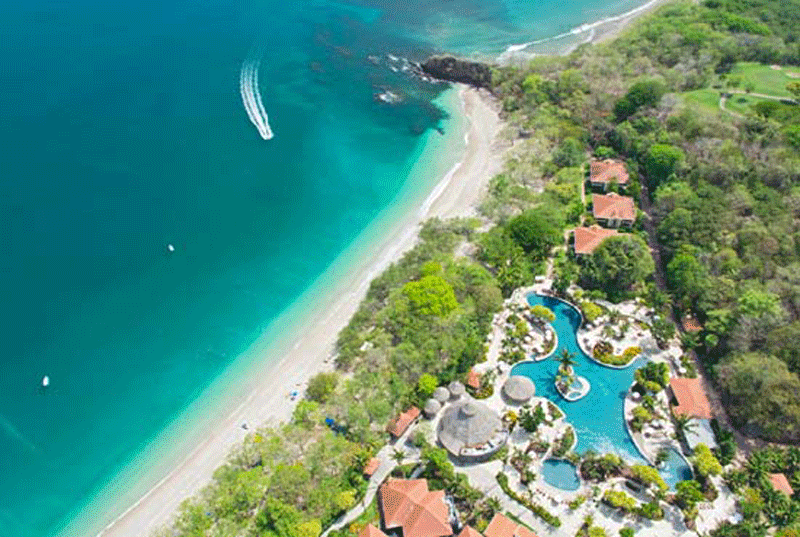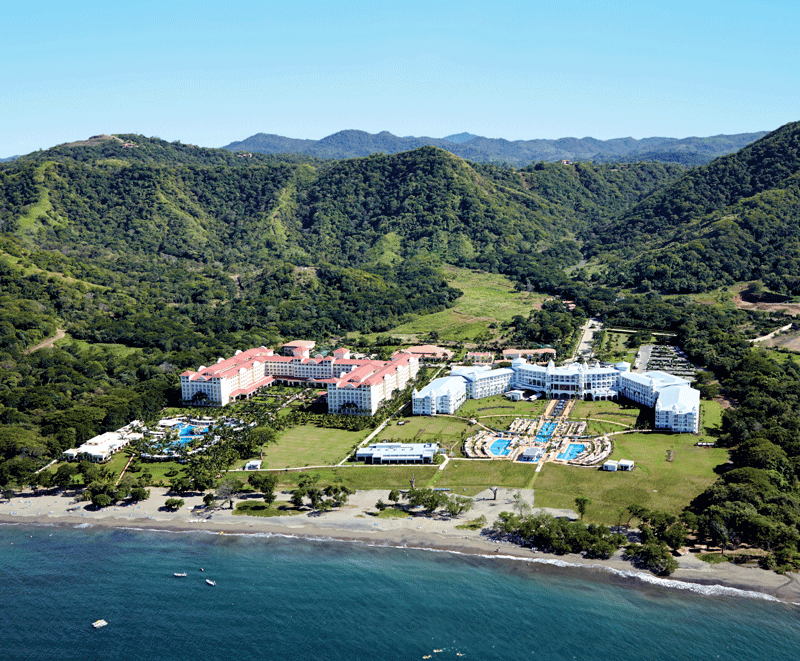Destination Description
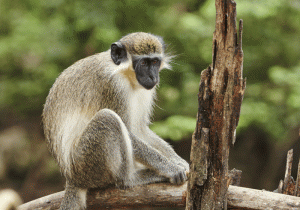
Costa Rica is an exhilarating land of luxuriant rainforests and mighty volcanoes, of natural hot springs and shimmering oceans, of colonial charm and captivating nightlife. In short, it’s a country where people can easily find their own true bliss. Nature thrives in its pristine state, with more than 20 natural parks and eight biological reserves. Exploring these ecological wonders is an exhilarating delight for the senses. Watch as exotic birds take wing in all their multi-colored glory. Smell the scent of orchids growing wild in the lush and magnificent cloud forests. Hear the call of the howler monkey as it lazily swings across the verdant canopy.
For the adventuresome, there’s hiking around majestic Arenal volcano as it explodes in a regular fiery splendor. For the wildlife lover, there’s Tortuguero National Park, where the beguiling sea turtle slowly makes its way to the sea. And for the sporty, there are the shimmering blue waters of the Pacific and the Caribbean, where surfing, fishing and snorkeling will fill endless sun-drenched days. The ultimate delight of Costa Rica is its people. Warm and gracious, they unveil a captivating culture of music, art, crafts and cuisine that will enchant, entertain and enliven you.
Activities and Attractions
Canopy Tour
This tour is a total adrenaline rush! The system consists of a network of suspended cables that go from one platform to another and that will let you zip from tree to tree over the forest. The platforms were carefully built on ancient, tall trees in the midst of the tropical dry forest, and allow you to fly between the trees and to see the wildlife up in the treetops. This is a perfectly safe activity, performed while wearing safety harnesses and other safety equipment that will be provided on-site.
Hanging Bridges In The Rainforest
Visit a site that encloses wonderful facilities which allow for a stunning hike through a Central American rainforest. The property counts with three hanging bridges that are between 34 and 40 meters up (111-131 ft), and that will provide you with a totally different perspective of the forest. While driving around the Pan-American Highway, you will be able to observe how the vegetation gradually changes and becomes greener and lusher. One of the first towns that you’ll encounter on your way to the rainforest is Bijagua. Agriculture is the most important economic activity in this town, and some of the plantations in the area are of sugarcane, coffee, plantains, as well as bananas, and assorted vegetables. You will also find some roadside artisan cheese stores at the homes of the locals. A dirt road will take you through the countryside, directly to the private reserve, which is locally managed. This beautiful property is around 700 meters (2,300 ft) above sea level and gets 4,000 mm (157 in) of rain during the year. You will be right in the middle of a unique place, where you could watch some of the 390 different species of birds and 7,000 species of insects, plants and fungi that biologists registered in this beautiful location. This entire combination creates an outstanding environment for people who want to truly live a rainforest experience!
Palo Verde National Park
Palo Verde National Park is located on 45,500 acres of land that are protected by law, and its wetlands have been declared internationally important by the Ramsar Convention. Palo Verde is part of a geographical unit know in Spanish as “Las Bajuras del Tempisque” (the lowlands of the Tempisque River). This area is crossed by rivers and a line of limestone hills. The flooding of the wetlands as a result of the poor drainage, the rains, and the high tides coming in from the Tempisque and Bebedero rivers, give the National Park its valuable characteristics. By traveling through this river on a motor boat, you’ll find around 12 different types of habitats, including four different species of mangrove trees, 55 aquatic plants and 150 species of trees, like the one from which the Park’s name is taken: Palo Verde, a shrub with leafy branches and a pale green trunk. The area boasts the largest numbers of aquatic birds in the Mesoamerican region from September to May. These birds gather at the lagoons and around different areas of the National Park. A couple of the most important ones are the Jabirus and the Scarlet macaw, both of which are endangered species. This is just one of the reasons why a large group of people are working hard towards trying to recover their populations. After lunch, sightsee Liberia, known as the White City, a name that comes from whitewashed colonial houses built of bahareque (similar to adobe houses).Calle Real (Royal Street) will take you back in colonial times, as you enjoy the opportunity to appreciate the daily life of the people from this picturesque place, its history, its handcrafts and the nearby stores.
Rincon De La Vieja National Park
Rincón de la Vieja is one of the most active volcanoes in Costa Rica. A towering volcano with nine extraordinary eruption points; at over 6,200 feet high, it is part of the Guanacaste Mountain Range. The name Rincón de la Vieja, means “the old woman’s corner”. According to a local legend, the indigenous people named the volcano after an old witch who lived at the top of the mountain and sent columns of smoke into the air when she was angry. It is a rigorous but spectacular, and breathtaking hike around the area of Las Pailas. Over 300 species of birds have been recorded to live within the park, like emerald tucanets, and long-tailed manakins. Amongst the numerous insects, you could count butterflies of the Morpho genus. Three different species of monkeys and other extraordinary animals also know this place as their home. The Park protects the largest population of wild purple orchids (Guarianthe skinneri), which is Costa Rica’s National Flower. Twisted trees with many branches and epiphytes are also found here; some of them are Matapalos of the Ficus genus, Guanacaste trees, Jumbo Limbos and many other different and glorious species surrounded by magnificent transitional forests. At these forests, the canopy reaches 132 feet in height. Along the hike, some 32 rivers rise out of this protected area, including the Colorado River and the Río Blanco, which carve through a white volcanic ash call ignimbrite. These rivers provide water to the Tempisque River, one of the most important in the province of Guanacaste.
White Water Rafting (class III/IV)
This tour is for the adventurous people, a three- hour river ride through wildlife, birds, monkeys and dense vegetation around you. After a couple of hours driving through countryside roads, you will arrive where the action begins. This experience will make you admire nature in its greatest expression while you paddle down the river against many rafts that make your adrenaline raise high. This tour lasts 8 hours. This tour includes transportation, bilingual guide, equipment and lunch. Passengers should bring water shoes, swimsuit, towel, change of clothes and sun block. This tour requires minimum 2 people to operate. Children under 14 years old are not allowed. Waiver is required.
Costa Rica Photos
Costa Rica Resorts
Secrets Papagayo
Set on Papagayo Bay along the Pacific coast of Costa Rica, Secrets Papagayo Costa Rica sits on a black, volcanic sand be
View Hotel
Dreams Las Mareas
Located on the Northern coast of Guanacaste in Costa Rica, Dreams Las Mareas Costa Rica is a gorgeous beachfront vista w
View Hotel
The Westin Playa Conchal
The Westin Golf Resort & Spa, Playa Conchal is an All Inclusive eco-friendly retreat, located between the exotic for
View Hotel
RIU Palace Costa Rica
Hotel Riu Palace Costa Rica is located in Guanacaste, Costa Rica at the edge of the beach of Matapalo. This new hotel, f
View Hotel



